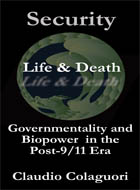
Theorizations of power through a Foucauldian conceptual paradigm continue to predominate critical analyses of the present geopolitical order. Michel Foucault’s concepts of “governmentality” and “biopower” have been central to critical understandings of the new world order of the post 9/11 era. With the fall of the Berlin wall, the 1990s were quickly characterized as a post-communist era with the promise of a burgeoning global civil society. Conversely, geopolitics at the start of twenty-first century took a new turn with the September 11 terrorist attacks on American soil and the Western world’s subsequent captivation with the war on terror. The post 9/11 era, in which we still firmly live brings with it a new political ontology based on specific risks and threats of disaster that are met with various forms of intensified security and control measures. The official state response to the problems of “terror” and “insecurity” has since shifted much social thought to the issue of the normalization of autocratic political power and the struggle for human rights. The new governmental agenda of security compels agencies to patrol citizens and intervene in the affairs of foreign nations with the renewed fervour demanded during wartime. Individuals, social groups, and nations are compelled to make sense of this new and precarious dialectic between security and liberty that profoundly shapes our collective life-worlds. The essays collected in this volume both inform and challenge the reader to examine the real consequences for security, life, and death in the post 9/11 era.